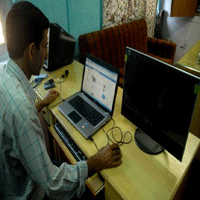  Internet is making inroads into the lives of the people in a big way all over the world and more and more people in the growth markets are getting addict to this. But the flip side of this is that this addiction is making people confident while online.
According to the latest findings released from Digital Life, a global study by TNS, a Kantar company and part of WPP, people in BRIC (Brazil, Russia, India and China) nations have benefited most from this addiction. Apart from the confidence, people in these countries are expanding their potential and making the most of the opportunities available to them.
The study presents the most comprehensive view of how more than 72,000 consumers in 60 countries behave online and why they do what they do, which was conducted during 2011.
When asked if the Internet helped to improve their self-confidence, just 12 per cent of those online in France and Germany agreed, compared to 42 per cent of Internet users in China, 52 per cent in India and 55 per cent in Vietnam. This peaks in Saudi Arabia where almost four out of five Internet users (79 per cent) feel more confident online.
With this new-found confidence, people in fast-growth markets are finding their voice online – 44 per cent of the Internet population in Turkey are writing their own blog every week, as are 43 per cent in China and Mexico and 39 per cent in India. The only developed market to come close in terms of sharing their views is Italy, where 40 per cent of online Italians update their blog each week, compared to 14 per cent in the US and UK.
“We have seen that the Internet can become addictive; some of the most engaged are those people in markets where Internet access has been limited - as soon as the infrastructure becomes available people make the most of it,” said Matthew Froggatt, chief development officer, TNS. He continued, “Really understanding this emotional connection to the Internet presents significant opportunity for companies who need to reach consumers in new markets to build their business.”
Spending time online has a big impact for consumption of other media. As Internet access has opened up, so TV viewing is starting to drop off. In China and Brazil, approximately 20 per cent more Internet users will go online each day than will watch TV. Conversely, where online infrastructure is still in development, TV maintains a hold and in Egypt, Thailand and the Philippines Internet users are much more likely to watch TV every day than go online.
Mobile broadband has been a significant catalyst in accelerating Internet access in many fast growth markets. Whilst 36 per cent of people surveyed by TNS globally said they had accessed the Internet via mobile in the past week, the figure was 49 per cent in China, 53 per cent in Singapore, 68 per cent in South Africa and 30% in India. This is particularly true in Africa, where people going online in South Africa, Nigeria and Kenya are more likely to use a mobile phone than a PC.
“Introducing people to the Internet for the first time in its mobile format has a huge bearing on their response and engagement with it. Their experience of the Internet is imbued with all the other benefits and excitement these markets see in mobile: opportunities to develop new business models, make new connections, participate in new markets and access infrastructure like banking”, Shailendra Gupta, Associate Vice President, TNS India comments. |